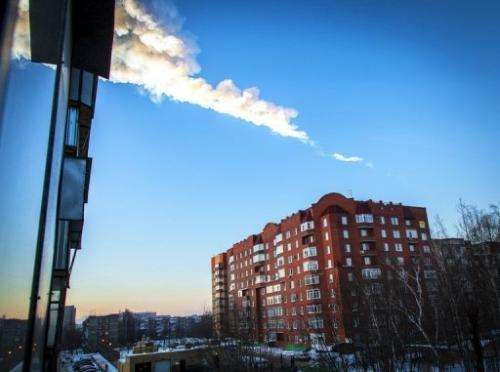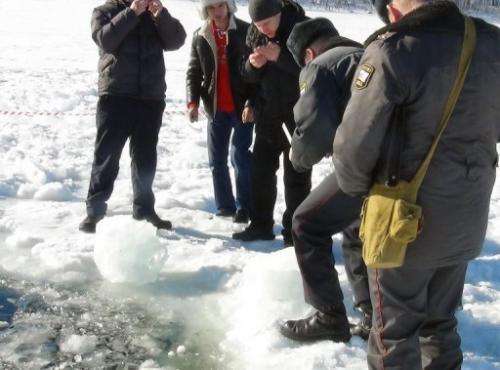Scientists claim discovery of Russian meteorites

Scientists announced the discovery Monday of dozens of tiny fragments of a massive meteor whose ground-shaking shockwave hurt 1,200 people and damaged buildings across five regions of Russia.
The giant space rock streaked spectacularly over the central city of Chelyabinsk on Friday before exploding with the force of 30 of the nuclear bombs dropped on the Japanese city of Hiroshima during World War II.
There was initial disappointment when Russian emergency ministry workers who scoured a lake where at least some of the fragments were believed to have fallen were unable to find anything in their initial search over the weekend.
But members of the Russian Academy of Sciences who conducted chemical tests on some unusual rock formations they found on Sunday said the pieces had come from outer space.
"We confirm that the particles of a substance found by our expedition near Lake Chebarkul really do have the composition of a meteorite," RIA Novosti quoted Russian Academy of Sciences member Viktor Grokhovsky as saying.
Grokhovsky's Urals Federal University separately posted a photograph of a person holding a tiny piece of a black shiny rock between his index finger and thumb.
"This meteorite belongs to the class of regular chondrites," the university statement said in reference to a type of meteorite that contains small mineral granules.

Grokhovsky said the rock in question—one of a set of 53 that measure no more than a centimetre (half an inch) in length and were found in the snow near the lake—was composed in part of iron as well as chrysolite and sulfite.
The emergency ministry said it could not comment on the scientists' find because it was focusing on the search for a much larger meteorite that could have blasted an eight-metre (26-foot) ice hole in the lake.
"That was quite a large hole in the ice sheet cover, and we are looking for an object of a corresponding size," ministry spokesman Vyacheslav Ladonkin said by telephone.
The meteor's shockwave blew out the windows of nearly 5,000 buildings and left 20 people still recovering in hospital Monday with injuries such as broken bones and concussions.
Officials said about a third of all the shattered windows had been repaired by Monday afternoon thanks to emergency shipments of glass from neighbouring regional factories.
"We have to replace about 200,000 square metres (50 acres) of window panes and other glass," the region's governor Mikhail Yurevich said in a statement that announced the reopening of Chelyabinsk elementary schools Monday.
The sonic boom created an invisible wave of momentous force that toppled the walls of a brick zinc factory and damaged two ice hockey arenas as well as a judo centre and a brand new swimming pool built for an upcoming European water polo championship.
But the elusive meteorites—meteor fragments that have hit Earth—have generated almost as much attention as the enormous repair and restoration work.
Russian space debris hunters have posted ads on websites offering as much as 300,000 rubles ($10,000) for an authentic piece of the latest space rock to hit the planet.
Chelyabinsk authorities responded by cordoning off the area around the lake to keep away any media or independent researchers hunting for meteor fragments.
The region's police said they were also investigating reports that some people have put up advertisements for space fragments for sale that were almost guaranteed to be fakes.
(c) 2013 AFP




















